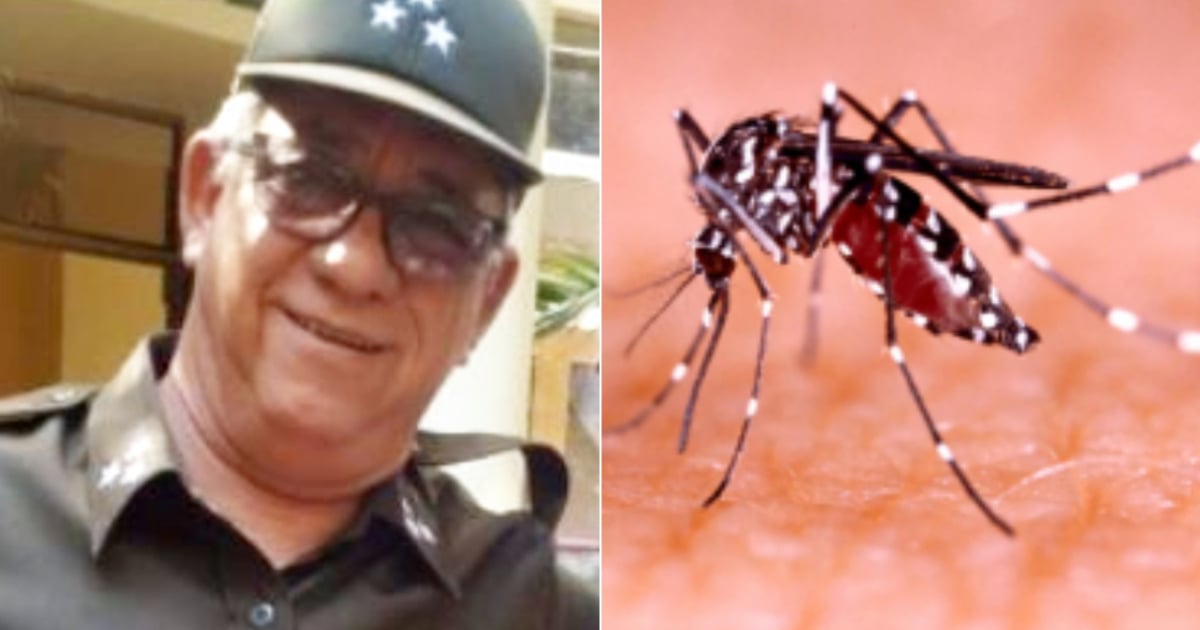
Colonel Lázaro Delgado Chaple, second in command of the Identification, Immigration, and Foreigners Directorate (DIIE) of the Ministry of the Interior (MININT), recently passed away in Cuba, allegedly due to complications arising from the Oropouche virus.
The news, which initially circulated on social media through posts by officials of the Cuban regime, has been surrounded by official silence and the deletion of posts, leading to speculation about the true public health situation on the island.
Orestes Hernández Hernández, an official of the Ministry of Foreign Affairs (MINREX), was one of the first to report on the death of the colonel through his Facebook account, stating that Delgado Chaple had been "a victim of complications arising from Oropouche."
This statement was supported by Miguel Ángel Moreno Carpio, consul of Cuba in Mexico City, who highlighted the colonel's willingness to collaborate on various consular tasks. Both publications were captured by the independent media outlet CubaNet, which reported on the incident this Tuesday.
Shortly after their disclosure, the posts were removed from the social media accounts of both officials, leaving an information void that has been filled by reports from independent media and screenshots taken before the censorship.
So far, no official details have been provided about the death of Delgado Chaple, and the Ministry of Public Health of Cuba (MINSAP) has not publicly reported any deaths associated with the Oropouche virus, despite the increasing cases across the country.
A controversial legacy and its inclusion in the list of repressors.
In addition to his career in the MININT, Delgado Chaple is identified by the Foundation for Human Rights in Cuba (FHRC) as a repressor linked to the forced expulsion of activists, journalists, and citizens critical of the Cuban regime.
According to Hernández Hernández, the deceased colonel was part of the team that worked from the airport to secure President Barack Obama's visit to Cuba. Subsequently, he was in charge of the renovation work of the Museum of Denouncement, an idea by General Raúl Castro that was realized in August 2017 to narrate "the Cuban people's confrontation with imperialist actions."
The FHRC announced in 2022 its intention to include the colonel in its database of repressive figures, a register that documents officials involved in human rights violations. The possible inclusion of the head of the Identification, Immigration, and Foreigners Directorate of MININT, Colonel Mario Miranda Rivera, was also mentioned.
However, a recent review of the database conducted by Diario de Cuba does not yield results for either of the two colonels from MININT.
The death of Delgado Chaple adds to a growing list of complications attributed to the Oropouche virus in Cuba, which has raised concerns both within and outside the country.
The government's hermeticism and lack of transparency in communicating health risks not only fuel distrust but also highlight the public health challenges the island faces amid an unprecedented health crisis.
The Oropouche virus in Cuba: an underestimated danger
The Oropouche virus is transmitted by mosquitoes and has affected hundreds of people in Cuba, according to MINSAP, although no deaths have been mentioned to date.
In August, the official number of diagnosed cases since May had risen to 506, some of whom developed meningitis as a complication, a situation that reinforces criticism regarding the lack of transparency in the management of the health crisis.
Miguel Ángel Ruano, president of the Free Cuban Medical Guild, has repeatedly denounced that the lack of medications and the inadequate handling of cases contribute to serious complications and deaths associated with the virus.
"The health system of the Island is not prepared for the Oropouche virus," Ruano warned in statements given to CiberCuba at the end of May.
"Deaths from acute febrile syndrome of unspecified cause are being ambiguously recorded in death certificates, which hides the true incidence of Oropouche," Ruano stated in late June.
At the end of August, the case of Samuel Eugenio Crespo Martínez, a 26-year-old Cuban doctor from Cabaiguán in the province of Sancti Spíritus, was reported. He was in critical condition due to encephalitis caused by the virus.
Furthermore, the death of a student in Santiago de Cuba in June raised concerns about the lack of transparency from health authorities, who have not officially reported on the deaths attributed to this virus.
"In Cuba, we do not have severe, critical cases, much less fatalities due to this disease," emphasized Dr. Francisco Durán, national director of Hygiene and Epidemiology, at the end of August.
However, the expansion of Oropouche in Cuba underscores the health crisis on the island and the challenges in its management that it poses to a regime that has turned its back on the country's Public Health system, causing the collapse of hospitals and the most severe shortage of medicines in its history.
What do you think?
COMMENTFiled under: